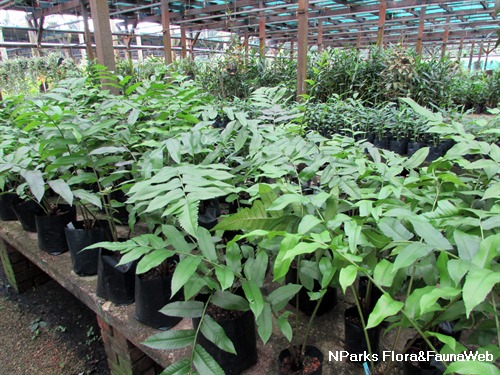.jpg)
Back
Diplazium sorzogonense (C.Presl) C.Presl
| Family Name: | Athyriaceae |
| Synonyms: | Asplenium sorzogonense C.Presl |
| Common Name: | Paku Kijang |
Diplazium sorzogonense or Paku Kijang is a terrestrial fern with bipinnate fronds held on a dark brown stalk that is nearly black at the base. Leaflets are lobed, narrow lance-shaped while the sori elongate along the veinlets and does not cover the veins entirely. Paku Kijang is native to Singapore, often found in lowland and mountains of dense evergreen forests.
Name
Classifications and Characteristics
| Plant Division | Ferns & Lycophytes (Non-Seed Vascular Plants) (Fern) |
|---|---|
| Plant Growth Form | Herbaceous Plant |
Biogeography
| Native Distribution | South Thailand to Marianas |
|---|---|
| Native Habitat | Terrestrial |
| Preferred Climate Zone | Tropical |
| Local Conservation Status | Native to Singapore (Endangered (EN)) |
Description and Ethnobotany
| Growth Form | It is a terrestrial fern with erect rhizomes measuring about 20cm tall. |
|---|---|
| Foliage | Its fronds are stalked, oblong to lance-shaped, bipinnate at 60 - 90 cm long and up to 40 cm wide. Fronds are papery to leathery, deep green and pale underneath. Each leaflet is narrow, lance-shaped, long tapered tip and box to heart shaped based. Leaflets are lobed, round toothed margins held on a dark brown often stipe that is nearly black at the base. |
| Others - Plant Morphology | Sori elongate along the veinlets often does not extending to the main veins. Covering (indusia) pale coloured but brown when dried. Basal scales are triangular, brown with black margins |
| Habitat | Occurs in lowland and mountain in dense evergreen forests at 600 - 1400 m altitude. |
| Cultivation | It prefers to grow under partial light, in moist, well drained soils. |
Plant Care and Propagation
| Light Preference | Semi-Shade |
|---|---|
| Water Preference | Moderate Water |
| Plant Growth Rate | Fast to Moderate |
| Rootzone Tolerance | Moist Soils, Well-Drained Soils |
| Propagation Method | Spore, Storage Organ (Rhizome) |
Foliar
| Foliage Retention | Evergreen |
|---|---|
| Mature Foliage Colour(s) | Green |
| Foliar Type | Compound (Bipinnate) |
| Foliar Arrangement Along Stem | Basal |
| Foliar Attachment to Stem | Petiolate |
| Foliar Shape(s) | |
| Foliar Venation | Pinnate / Net |
| Foliar Margin | Dentate |
| Foliar Apex - Tip | Acuminate |
| Foliar Base | Truncate / Square, Cordate |
Non - Foliar and Storage
| Stem Type & Modification | Herbaceous |
|---|---|
| Root Type | Underground (Fibrous Root) |
| Specialised Storage Organ(s) | Underground (Rhizome) |
References
| References | Tagawa,M. & Iwatsuki, K (1988). Pteridophytes. Flora of Thailand, 3(3), pp. 450 - 466. Bangkok: Forest Herbarium, Royal Forest Department. Royal Botanic Gardens, Kew (continuously updated). Plants of the World Online | Kew Science. https://powo.science.kew.org/taxon/urn:lsid:ipni.org:names:17088830-1. Accessed 22 August 2022. |
|---|
Image Repository
Others
| Master ID | 34216 |
|---|---|
| Species ID | 8629 |
| Flora Disclaimer | The information in this website has been compiled from reliable sources, such as reference works on medicinal plants. It is not a substitute for medical advice or treatment and NParks does not purport to provide any medical advice. Readers should always consult his/her physician before using or consuming a plant for medicinal purposes. |

.jpg)
.jpg)
.jpg)

.jpg)
.jpg)